There is no simple answer to whether Labs are good apartment dogs or not.
On one hand, the Labrador Retriever is known for being a good family dog, with a loyal, kind and caring personality. But on the other hand, the Lab has the reputation of being a destructive dog, naughty and difficult to control.
Actually, the Labrador can be both: a good apartment dog or a nightmare you don’t want in your life.
Having a Labrador in an apartment is not easy, but possible.
Labradors can be good apartment dogs but they require a responsible and committed owner. An owner willing to meet his needs and give him the time and attention needed to be a happy and healthy dog living in an apartment.
For this reason, it is necessary to know the breed well: its temperament and needs.
Make an informed decision and consider that having a Labrador, like any other dog, is a long-term commitment.
From my experience, I can say it’s worth the effort. The good nature, kindness and outgoing temperament of the Labrador Retriever make him a good companion and a great family member that can be one of the best medium-sized apartment dogs.
Things to Consider Before Having a Labrador in an Apartment
Labs Exercise Needs
The Labrador Retriever is a high energy breed. Is a dog that needs a lot of physical activity to stay physically and mentally healthy.
It is important to meet the daily physical activity needs of the Labrador. Having a daily exercise routine helps to have a calm, well-behaved and happy Lab.
If he doesn’t exercise enough, tends to be restless, show destructive chewing habits and even try to escape whenever he has the chance.
You also have to consider that Labs love to eat. This leads them to have overweight problems if they are not exercised enough.
If you are thinking about having a Labrador in an apartment, carefully consider if you are willing and have the time to meet his physical activity needs.
How Much Exercise Does a Labrador Puppy Needs?
A puppy during the first three months doesn’t need an exercise routine. They get tired fast and have their daily physical activity through their normal playtime.
After 3 months and at least until they are one-year-old, they should have 5 minutes of exercise per month of age. For example, a puppy of 3 months old should have a maximum of 15 minutes of exercise a day and one of 6 months, 30 minutes a day.
Exercise Needs of an Adult and Elderly Labrador
A fully grown up Labrador Retriever needs approximately 1 hour of exercise.
Activity needs may vary depending on each Labrador’s energy level. The Labs with less energy can be satisfied with 45 minutes of exercise a day. While other, with more energy, need an hour and a half or up to 2 hours a day.
From 6 to 7 years of age, their activity needs tend to decrease. But regular exercise is important for their health and well-being.
The consistency in the exercise is very helpful for the Labradors, but it is especially important for older dogs.
Labs Chewing Habits
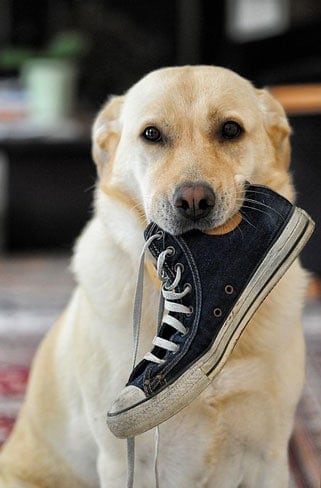
When deciding if a Labrador is the right dog for you, consider that destructive chewing is something you will have to deal with and you will need to spend the time to handle it correctly.
Chewing, even destructive chewing is a common and normal behavior in dogs. Especially in puppies and young dogs. Lab puppies inevitably will chew and they need to chew.
Labs puppies chew a lot, especially when they are teething. They can cause a lot of stress and destruction in those first chewing months. They love to chew everything they have at their reach. From furniture, shoes, or even our feet and hands, which with its small and sharp teeth can be very painful.
In older dogs, chewing may be a sign that something is not right in your dog’s life.
One cause is that Labradors get bored easily if they do not have enough mental stimulation and exercise. Likewise, if they are left alone for long periods of time and don’t have how to entertain themselves constructively, they can be destructive, mainly chewing things.
In these cases, having a long exercise session before leaving him alone and, if possible, arranging for someone to take it out at midday to walk, helps a lot.
If he has his daily exercise, he is more likely to sleep and relax during the day, instead of looking for creative ways to entertain himself.
Whether it’s a Labrador puppy or an older dog, there are 3 things you can do to reduce and manage the situation besides his daily exercise routine.
Redirect the Chewing Towards Toys
One of the best ways to handle chewing is to direct the need for chewing to toys specially made for that.
Select well the chew toys that your dog may like. There are quite a few toys that are boring to Labradors and that can easily destroy.
For a dog, toys must have something attractive to them. For a Lab, it is usually food.
The most recommended toy for the Labradors is the Kong. It is a tough rubber toy that most dogs cannot destroy.
The particularity of the Kong is that it has a hollow center that is filled with treats or any food that your dog likes. A good tip is to freeze the Kong with the treats or food which complicates the access to the food.
A frozen Kong keeps the dog happy and entertained for a long time. Besides redirecting the chewing, your dog may have a good time trying to decipher how to get the food from the Kong which helps keep him mentally busy for a long time.
Limit Access to Things He Can Chew
Avoid having access to things you do not want him to chew. Do not leave things lying around your home and keep valuable things he can destroy out of reach.
When he is home alone, you can limit access to areas of the house where there is furniture or things that may be tempting for him to chew.
Avoid the Lab From Chewing Furniture
To prevent chewing furniture you can use special repellent sprays for dogs. These sprays have a smell and taste that dogs dislike.
An extra tip that my Labrador trainer gave me and that worked for me, is to put pepper on the furniture where he has the habit of chewing.
Labrador Shedding
Although they have short and smooth hair, they tend to shed a lot, although it varies a lot from one Labrador to another.
Labs shed throughout the year, but it is especially abundant 2 times a year, during spring and autumn.
You can manage and reduce the problems of shedding by brushing the dog regularly. It is recommended to brush him twice a week and, during the shedding seasons, at least once a day.
If someone in the family has allergies or if it bothers you to be constantly cleaning dog hair in your apartment, think about it before adopting a Labrador.
Labs Training
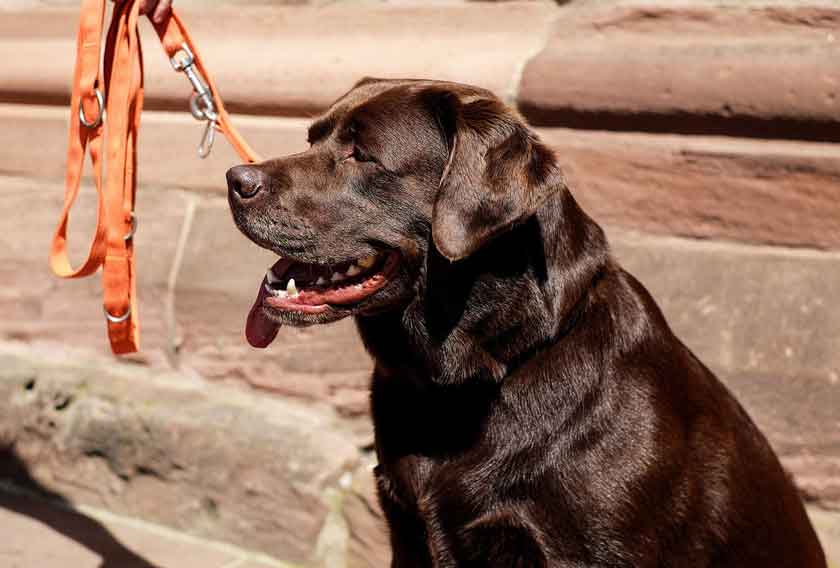
Labradors are very intelligent and easy to train dogs.
Being a smart dog can have its counterproductive side. If they are not mentally stimulated it is easy for them to get bored and find ways to entertain themselves with destructive behaviors.
Training is the best way to keep a Labrador mentally xstimulated.
Although they are easy to train, it requires time and patience. It is necessary to take some time a day to have a training session, either inside your apartment or somewhere safe outside and without many distractions.
If they receive the proper training, especially from an early age, they are obedient dogs with a well-balanced temperament.
Training your Lab since an early age has the following advantages:
- They create a stronger bond with you.
- It turns out that Labs have the reputation of being clumsy with their bodies especially in small spaces like an apartment. With training, they are more aware of what their body can do and learn to use it well.
- They grow with better social skills and relate better with people and other dogs and pets.
- Dogs strengthen their confidence in themselves and are sensitized to new textures, sounds, and sights.
- Labs quickly master the basic training commands like sit, stay, down and recall.
Potty Training
One of the most complicated parts of raising a dog in an apartment, not just a Labrador, is Potty Training.
When raising a lab puppy in an apartment we must consider the time and effort that this requires, mainly in the first months.
Puppies require more supervision and effort than a full grown-up dog for potty training. It is even highly recommended that during the first weeks of training, if possible, work from home or take a couple of weeks to devote time to training.
As a general rule, puppies cannot stand to go to the bathroom about an hour per month of age. A puppy of 2 months can hold going to the bathroom approximately 2 hours.
This means that potty training in an apartment requires going outside many times for the puppy to relieve himself.
One option that can be considered is using pee pads or grass pads. They help train your puppy while he can hold on for longer periods between potty trips.
Potty training in an apartment requires to be constant and patient and understand that accidents happen and be willing to handle them.
Labs Attention Needs
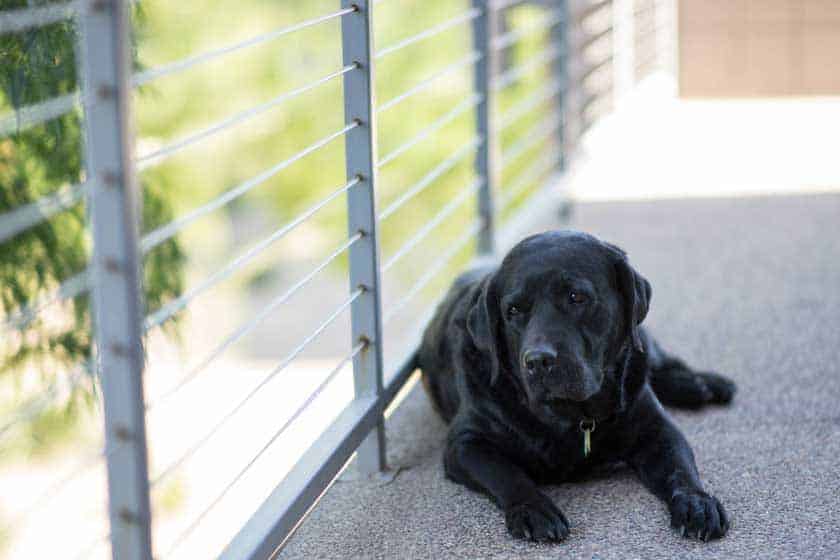
The Labradors are very sociable dogs. Interaction with people and other dogs is important and keeps them emotionally healthy and physically active.
They may suffer from separation anxiety, become sad or depressed if left alone for long periods of time.
Puppies of 8 to 10 weeks need a lot of attention. All their surroundings are strange to them. If they are left alone for long periods, they can get very distressed.
Gradually they have to get used to being more time alone.
If you work full time and your dog would have to stay alone for a long period, maybe the Labrador is not the right dog for you. Labs can become very destructive and noisy when they are alone for a long time.
But you could make it work if you carefully plan how you will keep him happy while you’re not home.
On the one hand, you can use a dog walker or a friend who can take your dog at midday for a walk. This helps him exercise more and reduce the time he is alone.
You can also take him to a dog daycare where he can socialize and play with other dogs while you are at work. Even in some doggy daycares, there are training sessions.
Summarizing Common Causes of Labrador Behavior Problems
A Labrador’s behavior problems are signs that something is wrong or something is missing in his life. Through his behavior is the way in which the dog faces certain circumstances.
Some of the most common causes of Labrador’s behavior problems are:
- Fear of something or someone in their environment.
- Health problems, pain or discomfort.
- A bad socialization since an early age.
- Lack of attention and isolation.
- Lack of exercise and mental stimulation.
- Changes in his daily routine.
- Inconsistency in the rules of his home.
- Lack of a comfortable and quiet place to rest.
Why Labs Are Good Apartment Dogs
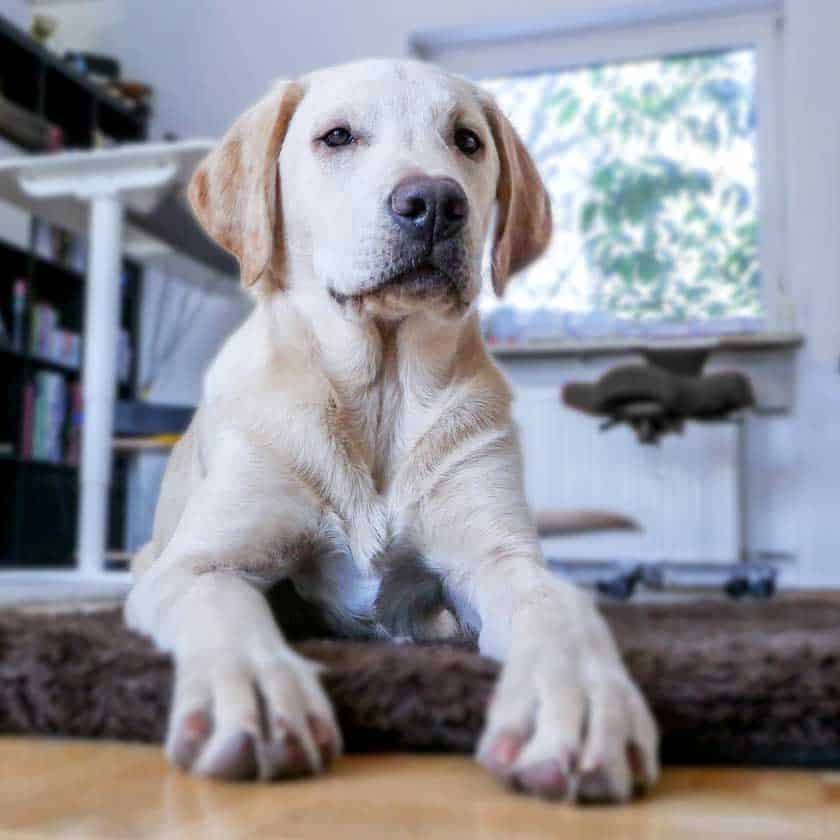
The Labrador’s Temperament
The Labrador is known to be one of the best family dogs. Engaging in activities with his family is his greatest satisfaction and happiness.
They are good companion dogs; they have a friendly personality, cheerful and outgoing. Because they are charismatic dogs and happy by nature, they do not tend to express anger or frustration.
Because of their friendly and social temperament, Labradors do not have guarding tendencies. So if you want a watchdog, the Lab is not the ideal dog for you.
They cheerfully welcome anyone in their home, whether they are acquaintances or strangers, they like to give and receive love. His cheerful, eager to please and social personality makes them easy to relate to people and to handle well unfamiliar environments.
Inside their home are docile, affectionate and even-tempered dogs. When they are outside, they are sociable and affable dogs towards all people.
Likewise, thanks to their affable and good and stable nature, they are considered one of the best therapy dogs. For this reason, it is also common they are used as service dogs, assistant to the handicapped and rescue dogs.
Easy to Train
Thanks to his intelligence and cheerful personality and always eager to please, one of the most valuable features of the Labrador Retrievers is his trainability.
Because of their intelligence, they are dogs that learn quickly and adapt easily. They are always willing to learn because they know it will make you happy.
There are several advantages of living in an apartment and that the Labrador is easy to train.
When living in an apartment you will have to interact regularly with your neighbors and sometimes with their pets. So it is important that he knows how to behave well around other people and pets.
Also, it will be easier and faster to potty train and, if necessary, to teach him not to bark and build up the time he can be alone calmly.
Good With Children and Other Pets
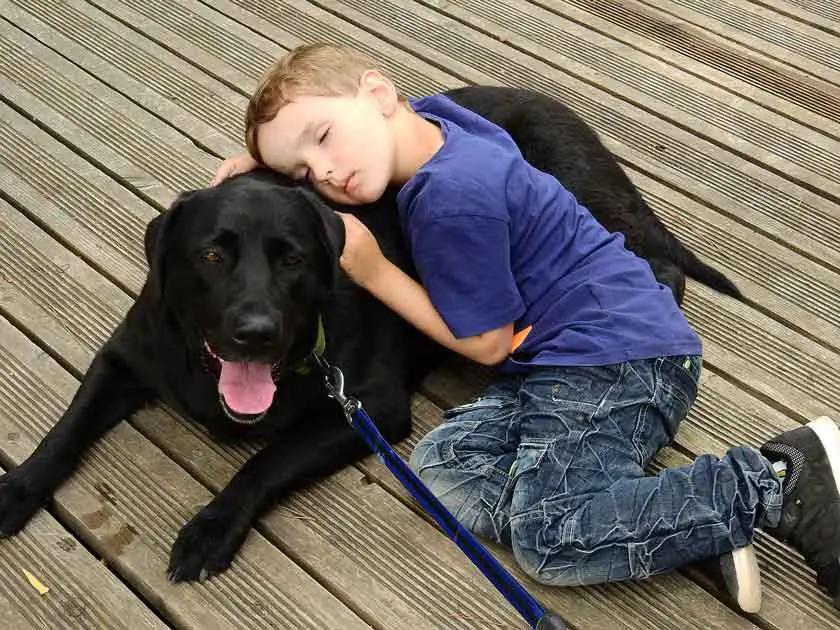
Labs and Children
His good-nature and kindness make the Labrador a good breed for homes with children. With a good socialization, they are truly patient and get along very well with children.
Due to their intelligence, they can differentiate very well the size of an adult and a child and the corresponding treatment with each one.
They are easy and delicate with the little ones and, not only do they love children, but they also enjoy the commotion they cause.
But as with all dogs, they need to be trained to interact correctly with children.
Likewise, children should be taught how to approach and treat a dog, since they usually pull the dog’s tail or ears or climb on them.
It is always good to supervise the interaction between a dog and the children to prevent incorrect actions of both parties, the dogs and the children.
Labs and Other Pets
Labradors are not aggressive towards other dogs or pets and can remain calm and controlled in difficult and unstable circumstances with other pets.
If he is exposed and trained to interact with other dogs or pets from an early age, he is great and friendly with them.
Easy Grooming
The Labradors are easy-maintenance. Despite its shedding issue, grooming is very easy compared to other breeds.
As I pointed out before, Lab shedding can be handled by brushing the dog regularly.
The Labs need to bathe every two months approximately to stay clean and smelling good.
But, since the Labradors love to swim and, at any opportunity, they will get into the water and it will be necessary to bathe them after each swim.
Also, it may be necessary to cut their nails once or twice a month. Although normally with their walks and exercise sessions, their nails wear down naturally.
An important care that must be taken into account with Labradors is that they can easily have ear infections. Check their ears weekly that they do not have a bad smell or redness. They can be signs of infection.
Infections in the ear are mainly caused by moisture. That’s why you must clean them after bathing them, swimming or after they get wet for any reason.
>You have to clean the outer part with a cotton ball and avoid inserting anything into the ear canal. A veterinarian can guide you on this.
7 Tips For Raising a Labrador Retriever in an Apartment

Choosing the Right Labrador Puppy
It is important to go with a Labrador breeder with good references. A good breeder can help you choose the puppy that best suits you and your lifestyle. Likewise, it assures you to have a Lab with a good and more predictable temperament.
When choosing a puppy, you must consider that puppies with high, medium or low energy can be found in the same litter.
Many people, when they choose a puppy, are always inclined to choose the most playful and Lively puppy in the litter. They are the ones that attract the most attention but are generally high energy dogs.
It is advisable to choose a puppy with the right energy for you and your family lifestyle.
If you are a very active person who likes to do a lot of physical activity, a high energy dog is the right choice. But if you are not an active person, it is better to choose a puppy with an energy equal to or less than yours.
The Daily Routine of Your Labrador
Dogs like routine and consistency. It helps them to be more calm and confident when they know what to expect during the day. It is important for their emotional and mental well-being.
Especially when living in an apartment, the daily routine is very important.
Dogs need to have their schedules stable for eating and going to the bathroom. The routine helps their metabolism get used to a pattern and adjust to it. This is an important part that helps in potty training. So they get used to doing their needs at the same time and in the same place.
The same happens with their walking and exercise routine. It helps them to distribute their activity and rest needs during the day.
When they get used to their Routine, is common that they warn you when it’s time to go for a walk or go to the bathroom.
Your Labrador Own Space
Dogs need to have their own space in the apartment.
It is important for them to have a private place where they have their bed, their toys, and their food and water.
It is easier for them to relax and rest when they have a space of their own where they can go when they need a break of the family fuss.
Some dogs prefer a more contained and closed place to rest, such as a Kennel or a small corner in the apartment.
Acclimatize Your Lab to His Environment
The life in a city apartment usually has many stimuli that can be new or scary for some dogs.
It is common to see or hear sounds coming from the street as well as hear the noise of the neighbors or their pets.
It is also common for neighbors, children, strangers or pets to pass in front of the apartment door. This brings endless noises and smells that can upset your dog.
For this reason, it is important to help your dog and gradually introduce all the sights, sounds and smells of apartment life so he feels comfortable with his environment.
Your Lab Socialization
Labs are extremely social. They need to interact with other people, dogs, and pets.
Living in an apartment and in the city means he will inevitably interact closely with both people and other dogs and pets.
Socialization is important because socialize dogs have better-coping skills. It is necessary that your dog knows how to handle different situations. Either with other dogs, pets, children or strangers who come to your apartment or who he meets on the street.
Socializing your dog from a young age has several advantages.
On the one hand, when he is socialized with other dogs, it helps him learn and understand their language. This allows him to handle situations better and feel safer with other dogs.
On the other hand, it is important that you know how to behave and feel comfortable with people. This allows him to be calm and relaxed around people and to be more calm and friendly in front of them.
A dog that learns to control himself in different situations is more likely to develop self-confidence and allows you to raise a happier, calmer, healthier and better behaved dog in general.
When Your Lab is Home Alone
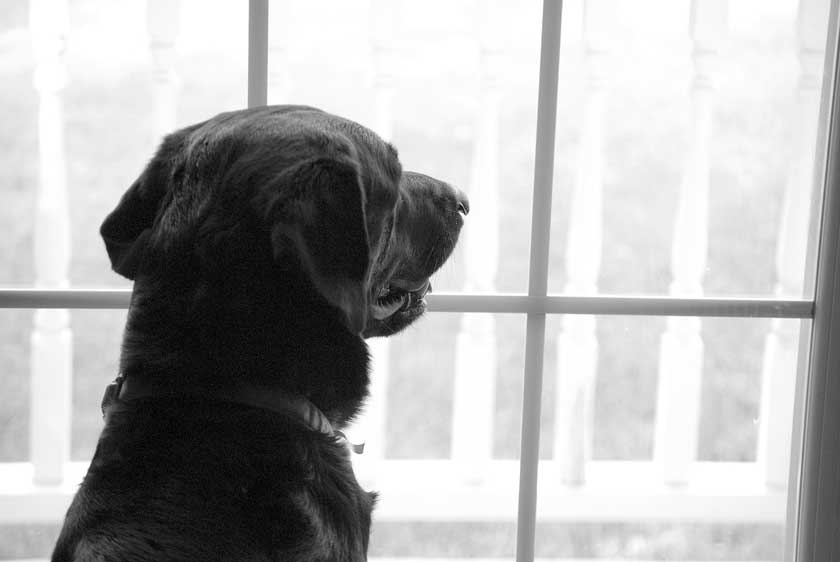
The Labrador is not the best dog to stay alone for long periods of time. What is generally recommended is not to leave them alone for over 4 hours.
As we mentioned before, Labs are very sociable and easily bored if they do not have the interaction and the necessary stimuli. This can lead them to manifest destructive behaviors when home alone.
If you will leave your Labrador alone for a long period, you can take measures that will help him be calmer and more relaxed.
- Make sure he has a long and good exercise session before you leave home. So your dog will prefer to rest than look for something to entertain himself.
- Leave him some chew Toys, like the Kong or some Puzzle toy. This helps him stay busy for a long time. It also helps to direct his chewing habits and keeps him mentally stimulated.
- If possible, consider taking him to a dog daycare. It helps him to socialize and exercise while you’re not with him.
- Get a friend, neighbor or professional dog walker to take your dog out at midday for a walk. This allows reducing the time your dog is alone and allows to have an extra session of exercise.
Visits to The Vet
Living in an apartment and in the city means that your dog will live and interact closely with other pets and people.
Regularly he will share and use common areas with other pets so it is necessary he is dewormed and have his vaccines up to date for his safety and that of others.
It is also important to have proof that your dog is vaccinated in case someone accuses your dog of biting him.

